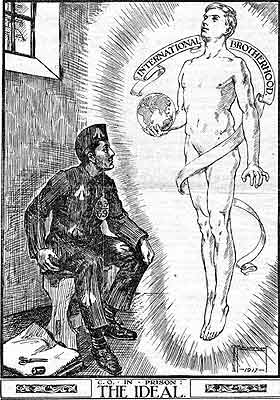The Historical and Philosophical Background of Modern Pacifism
by Harold F. Bing
Editor’s Preface: Harold Bing was chairman of WRI from 1949-1966. During World War I he was an “absolutist” conscientious objector, and received an unusually harsh sentence of three years imprisonment, while the norm was six months. He wrote pamphlets on pacifism, Palestine, and other topics. The Peace Pledge Union has an interesting article about him, at this link. This article is taken from War Resistance: Journal of the War Resisters, issue 39, fourth quarter, 1971. Please also see the archive reference information and acknowledgments at the end. JG

Drawing by a WWI British conscientious objector, courtesy ppu.org.uk
Although in origin the word Pacifism means merely ‘working for peace’ or ‘the creation of peace’, in recent years it has come to mean a code of conduct or a philosophy of life which rejects war of all kinds and relies upon nonviolence as a means of achieving both private and public ends. While, however, this interpretation of the word pacifism is relatively modern, the ideology which lies behind it is very ancient.
We know little about the moral code of primitive man, but there is considerable evidence to suggest that war, in the sense of organised conflict between groups of men specifically trained for that purpose, developed relatively late in human history and, in fact, coincided with the rise of private property in land and other primary sources of wealth and the division of society into classes differing in their privileges and possessions. The desire to secure economic advantages and social prestige, or to defend them if already possessed, led to armed conflict. Tools rather than weapons are found in the surviving remains of the earliest human settlements and no doubt a sort of communism characterised primitive human groups.
But as far back as recorded history goes, which is no more than some six thousand years out of the hundreds of thousand that man has been on the earth, mankind seems to have been troubled by wars and rumours of wars. At the same time there have been teachers, prophets and philosophers who have pointed out the evils of violence and suggested a better way.
Read the pdf of the complete article here: The Historical and Philosophical Background of Modern Pacifism
Reference: IISG/WRI Archive Box 122: Folder 2, Subfolder 1. We are grateful to WRI/London and their director Christine Schweitzer for their cooperation in our WRI project.




